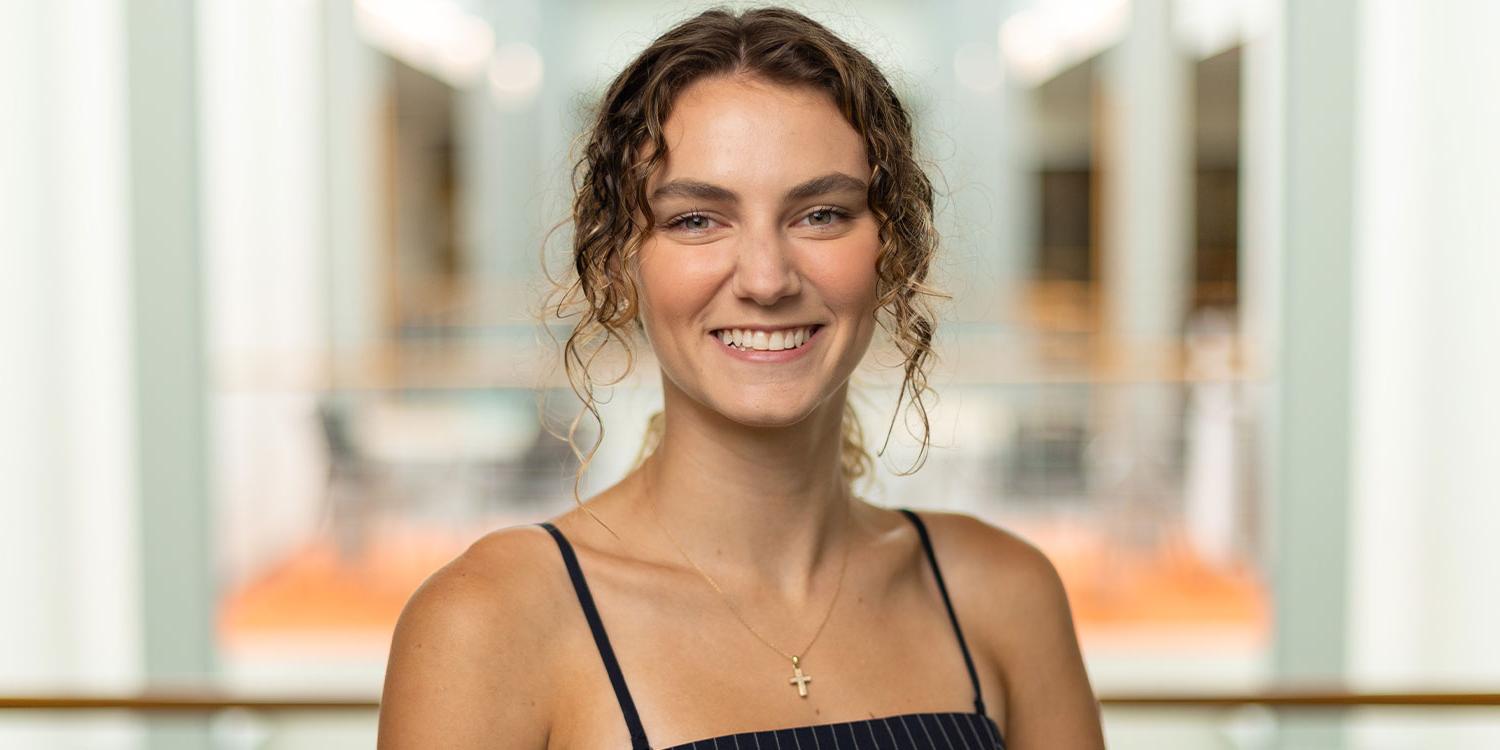By expanding the boundaries of vocal literature, Hannah Stewart ’26, vocal performance and music technology, is redefining inclusivity in music education. Under the mentorship of Dr. Caroline Bergan, voice, Stewart has developed the Inclusive Linguistic Database, a groundbreaking resource designed to broaden vocal repertoire beyond the traditional focus.
“In most undergraduate and graduate universities, they only teach English, German, French, and Italian lyric diction, sometimes Latin. Students do not get the opportunity to sing in other languages and learn from other backgrounds and other cultures,” said Stewart.
“For my junior recital, I sang in Czech, but most students don’t even know those songs exist. Dvořák is a very well-known name, so they might look into his work and see what vocal scores he has. They might find a song that sounds really nice, but it’s in Czech. Their next question might be, ‘Where do I even start?’ Their teacher doesn’t know because they weren’t taught that — again, they were only taught English, German, French, and Italian. So then, where does the student go?”
As a Capital University Summer Scholar, Stewart spent her summer working on her research project, “Expanding Vocal Literature: An Inclusive Linguistic Database.” Bergan served as her faculty mentor.
“Conservatories and universities have been content with sticking to the traditional canon of vocal literature. Any student, educator, vocalist, conductor, and vocal coach knows well the repertoire that exists goes far beyond this scope. What Hannah has done is compile all the resources available of lyric diction and phonetic resources for accessible repertoire that currently exists. This is invaluable as she has made choosing vocal repertoire a more inclusive process,” said Bergan.
“Working with Hannah has been a true joy. What I most enjoyed is her inquisitive nature, perhaps this was what made this project that much more special. As her advisor on this project, I was able to help her navigate the process of developing, writing, researching, and editing a project of this magnitude. So often, as many scholars know, the initial idea can turn into something quite different than originally intended. Any singer, teacher, or institution would be lucky to benefit from the database she has created.”
The inspiration for the project is deeply personal. Stewart’s family is Ukrainian and German and came to America during WWII. Language and culture have always played an important role in Stewart’s life.
“My grandmother still speaks German. She’s able to read things and translate them for us. There are certain cultural nuances that come with having an immigrant as a family member. Additionally, I have spoken German since I was a very small child,” said Stewart.
“The good thing for me is that German is taught as a diction class, but Ukrainian has never been taught. Off the top of my head, I can tell you there’s only one resource available for Ukrainian lyric diction, the Ukrainian Art Song Project. On that website, the information is extremely detailed, and it features four or five composers who are fairly well known in Ukraine. However, there are far more than just four or five Ukrainian composers who have created art songs.”
The database not only provides tools for pronunciation but also exposes users to the cultural and historical contexts of different regions. Stewart highlights how Ukrainian art songs, for instance, often reflect the country’s history of war and folk traditions, creating a distinctive sound that challenges Western tonal norms. “Information on pronunciation gets you further than just language, it opens up the art songs, cultural heritage, and historical background of a country,” she said.
The goal of Stewart’s project is to create a database that allows anyone, regardless of background, culture, or interests, to find exactly what they need. The database has been designed to be accessible, easy to understand, and equipped with resources that teachers can use to help guide their students.
“We’re trying to create this database that gives those students, those teachers, the ability to expand what opportunities and what vocal literature is out there. Especially for those whose families are immigrants or have a different cultural background,” said Stewart. “If I were a teacher, I’d want to be able to easily locate materials for my class or specific topics. As a vocal literature educator, I’d want to access a comprehensive list of operas from around the world. Similarly, music theory educators and those teaching IPA pronunciation could use this database to explore and expand the boundaries of vocal literature.”
Stewart’s Summer Scholars project exemplifies the transformative potential of student research, offering an innovative model for inclusivity in music education. It highlights how research can bridge cultural divides and celebrate the richness of global traditions.
For more information on the Conservatory of Music at Capital, visit http://rdl4.sanmingzhi.net/academics/conservatory-of-music/.
To learn more about Capital’s Summer Scholar Program, visit http://rdl4.sanmingzhi.net/academics/experiential-learning/undergraduate-research/summer-scholars-program/.
